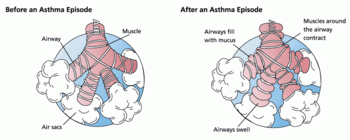
Your body produces nitric oxide (NO) as a way to fight inflammation, relax tight muscles and increase blood flow. High levels of exhaled nitric oxide in your breath can mean that your airways are inflamed — one sign of asthma.
Researchers have recently discovered a substance called anti-thymic stromal lymphopoietin (TSLP) that seems to aggravate inflammation and trigger response to allergens in adults with allergic asthma.
In a small double-blind study asthma patients treated with AMG-157 (Amgen) over nearly a 3-month period reacted significantly less to asthmatic challenges than those not treated. Amgen is a human monoclonal antibody that inhibits TSLP activity by binding to it.
Study results reported adults with allergic asthma were shown to have “reduced the fraction of exhaled nitric oxide and blood and sputum eosinophils,” both of which are markers for airway inflammation. Dramatic promise for patients whose asthma is not well-controlled by other means.
Related articles
